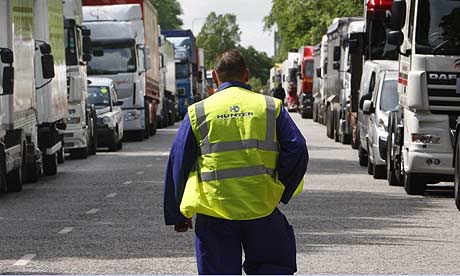
Gordon Brown yesterday called on motorists not to panic buy fuel as ministers activated emergency measures with the oil industry ahead of a threatened four-day strike by tanker drivers starting on Friday.
Government efforts to minimise the impact of the looming industrial action come amid fears of petrol shortages, record gas prices and separate warnings that oil costs may almost double to $250 a barrel within 18 months.
"The most responsible thing the public can do is to continue to buy as normal," said a spokesman for the prime minister who expressed disappointment that the action by Shell tanker drivers was due to go ahead.
The Department for Business believes it is "inevitable" that some filling stations will run out of fuel because Shell controls one in 10 forecourts around the country.
"If the strike were to affect other retailers, it would have a more significant impact. The government is working with the wider fuel industry on what could be done to reduce any disruption to the public and business," the department said.
Ministers are prepared for even greater problems than those witnessed when the Grangemouth refinery was hit by industrial action in April. Special measures have been agreed with the oil industry to safeguard fuel for emergency services and ensure that petrol and diesel can be moved quickly to areas of need.
Brown is sensitive to fuel disputes because he was forced, when chancellor, to drop tax increases in the face of protests over rising energy costs.
More than 80 lorries travelled in convoy from Glasgow to Edinburgh where truckers handed in a letter to the Scottish parliament protesting at fuel prices. The UK government is being pressed to dump a tax increase planned for October.
The chances of fuel prices falling back in the short term receded further yesterday with Russia's Gazprom, one of the largest energy companies in the world, warning that oil could rise from today's closing price of $131 a barrel to $250. "We think it will reach $250 a barrel in the foreseeable future," chief executive Alexei Miller said at a presentation in France, adding that high demand rather than speculation was the primary cause.
A spokesman said Gazprom expected the price to reach $250 during 2009. British forward gas prices for next winter rose to a record £1 a therm yesterday, 67% up on the start of the year, according to market information publisher ICIS Heren.
The Unite union, which represents the Shell tanker drivers, said very high oil prices were giving £1.3bn monthly profits to the oil company at a time when it was denying the drivers a deal which would cost it under £1m. "Only Shell sets the terms of this contract and only it can solve this dispute. This is one of the most profitable companies on Earth and it now needs to provide the financial flexibility to avert this dispute," said Unite assistant general secretary Len McCluskey.
Shell said the 500 drivers, who have rejected a 13% pay rise, were employed by third party haulage companies Hoyer UK and Suckling Transport. "We are doing everything we can to avoid and minimise the impact of Unite's industrial action," it said. The union is expecting to hold talks with the Shell contractors at the arbitration service Acas in a last-ditch effort to reach a settlement.
Oil prices have risen 40% this year, pushing up the price of petrol and diesel. But producers and others remain split over whether this is caused by supply problems, growing global demand or financial speculation.
As prices rose yesterday to $137.10 a barrel in New York before closing at just over $131, Abdullah al-Badri, secretary general of the Opec oil cartel, said the high oil price was "unbearable" but did not reflect any shortage of supply in the market.

